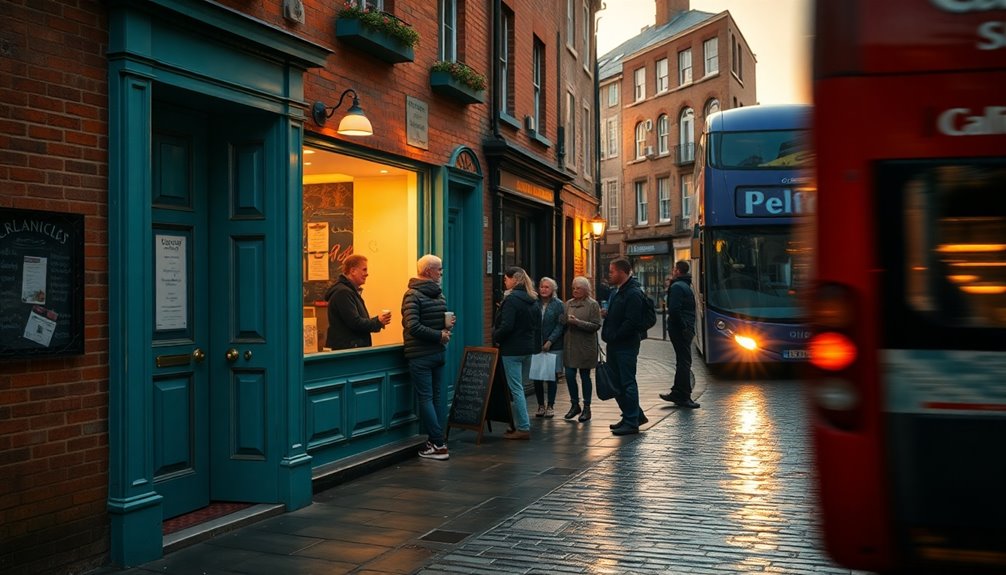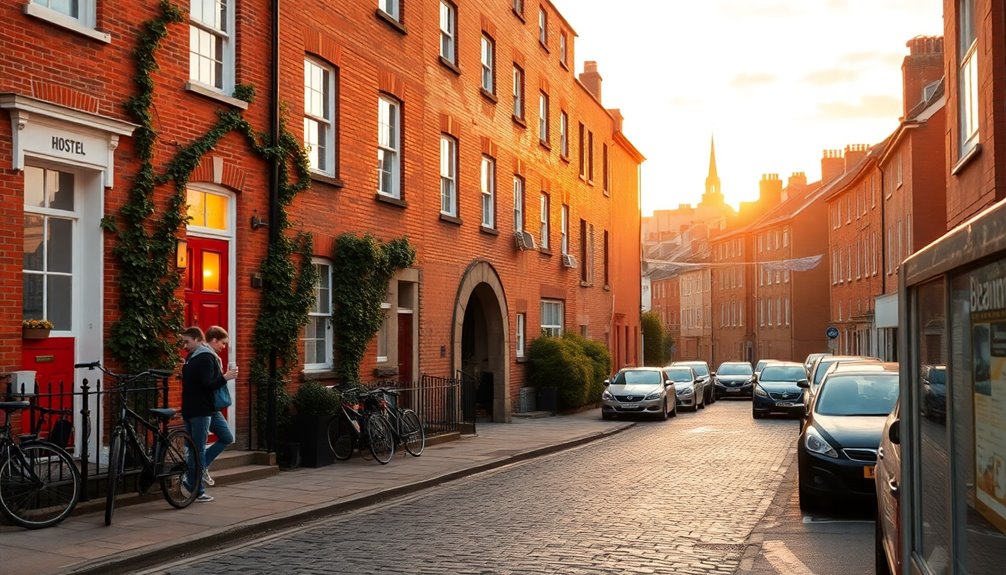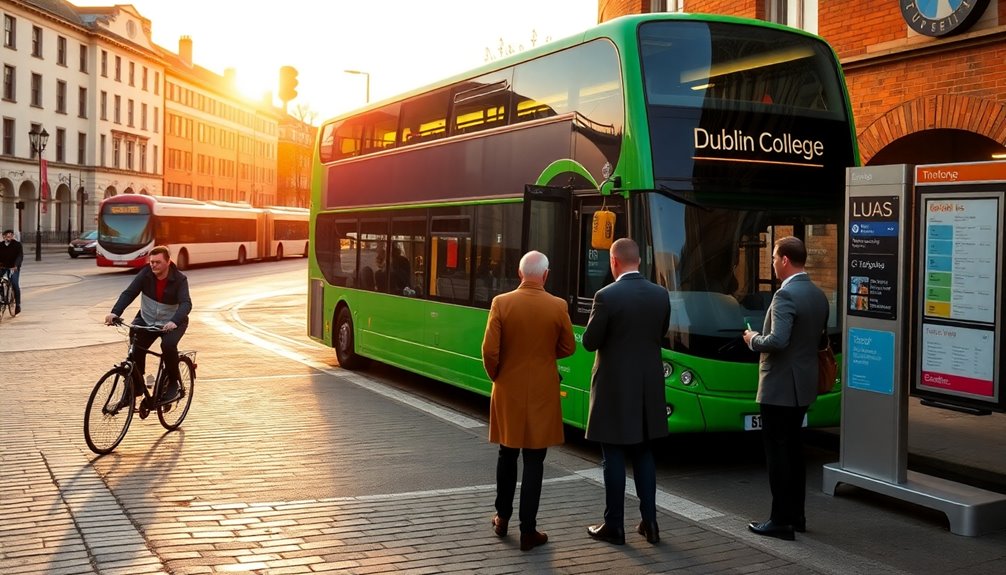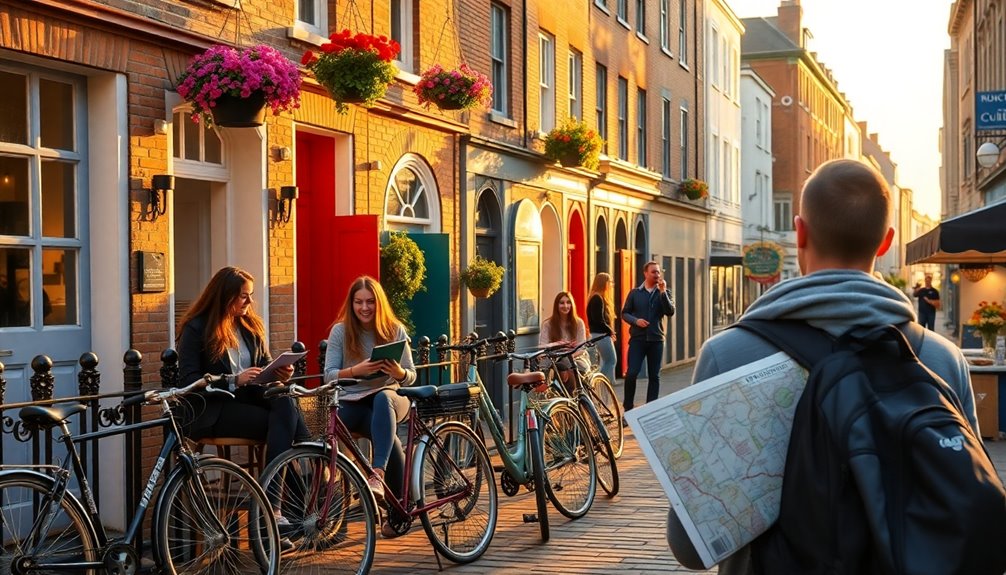
If you’re doing intensive English in Dublin, live where locals hang out—cafés, pubs and small streets—so you’ll hear clear, friendly speech and get real practice. Pick a student-friendly neighborhood with short commutes and study spots. Use a Leap card, learn tram etiquette, and try markets for cheap meals. Volunteer or work part-time to build confidence. Keep emergency contacts and a GP lined up. Stay curious and you’ll find plenty more practical tips ahead.
Highlights
- Choose compact neighborhoods (Temple Bar, Rathmines, Stoneybatter) to shorten commutes and maximise daily English practice.
- Join language exchanges in cosy cafés and pubs for low-pressure, real conversations with locals.
- Use Leap cards, learn tram etiquette, and time walks between stops to save hours and meet people.
- Volunteer or work part-time in cafes, markets, or community centres to build practical vocabulary and confidence.
- Learn local phrases (“grand,” “what’s the craic?”) and mirror friendly Irish humour to speed social integration.
Why Dublin Is Ideal for Intensive English Students
While you walk Dublin’s compact streets, you quickly notice how the city itself becomes a classroom: friendly locals, clear signage, and cafes where conversations flow in English. You’ll find language immersion everywhere — pubs, markets, tram rides — pushing you to use new words naturally. Cultural experiences fold into lessons: music at a corner session, history on a guided walk, banter with a shopkeeper. You’ll feel liberated to experiment, make mistakes, and recover with a grin. Dublin’s manageable scale keeps learning immediate and social, so progress feels earned, quick, and distinctly yours.
Finding Student-Friendly Neighborhoods
You’ll want to scout neighborhoods that balance rent you can afford with a real sense of community. Think about how long your commute will be—frequent buses and reliable trains can turn a cheaper area into a smart choice. I’ll point out pockets around the city where prices, transport links and student life line up.
Affordable Housing Areas
Because rent can eat up most of a student budget, finding neighborhoods that balance price, safety and transport is essential. You’ll scout the best neighborhoods where cafés, parks and study spots mingle with affordable rooms. Walk early, listen to doors closing, watch bikes lean against railings — you’ll know a place that feels right. Ask locals for rental tips: inspect heating, check bills included, meet flatmates, and confirm lease terms. Aim for areas with lively streets but calm nights so you can study and roam freely. Freedom means choosing a base that supports your days, not ties that drain them.
Transport and Commute
If you want a neighborhood that won’t turn your commute into a daily grind, look for places where bus routes, Luas stops or DART stations sit within a 20–30 minute radius of campus and nightlife. You’ll value areas served by frequent Dublin bus lines or a nearby Luas tram stop — they give you time back for study, coffee and wandering. Scout weekend timetables, late-night links and bike parking. Think about transfers, crowding and safety after classes. Choose streets with cafes and laundrettes en route so your commute feels like part of city life, not a chore.
Affordable Accommodation Options Near Colleges

You’ll weigh student halls’ convenience and social buzz against the privacy and independence of renting an apartment. For short stays or tight budgets, budget-friendly hostels can bridge the gap while you search. When sharing a house, practical tips on bills, chores and location will keep costs low and stress down.
Student Halls vs. Apartments
While student halls can feel like a built‑in social network, apartments offer privacy and control—so choosing between them comes down to whether you value community convenience or independent space. You’ll find student halls pulse with instant company, shared kitchens, and events that drag you into city rhythms. Private apartments give you quiet mornings, the freedom to set your own rules, and room to breathe after class. Think about commute, bills, and how much noise you’ll tolerate. If you crave autonomy, pick an apartment; if you want easy friends and structure, halls suit you. Both can be affordable if you shop smart.
Budget-Friendly Hostels
One of the easiest ways to stretch your budget in Dublin is to choose a hostel near your college — they’re practical, social, and usually a short walk or bus ride from campus. You’ll find cheerful common rooms where conversations spark, kitchens that save you euros, and noticeboards with cheap gigs. Use hostel reviews to spot quiet nights, secure lockers, and friendly staff. For freedom-seeking students, hostels let you meet locals and other learners without long leases. Pack light, lock valuables, and haggle for weekly rates when possible. These budget tips keep your options open and your spending low.
Shared Houseroom Tips
If hostels gave you a taste of communal life but you want more stability, shared houses are the next step — especially near colleges where rent’s split and commutes shrink. You’ll scout rooms online, eye neighborhoods that feel alive, and weigh proximity against price. Shared living means cheap freedom, but also compromises: set clear boundaries, rotate chores, and agree on visitors to keep peace. Watch roommate dynamics early — habits reveal themselves fast. Keep your space minimal, lock valuables, and trade skills for goodwill. In Dublin, a good housemate network doubles as local orientation and affordable independence.
Navigating Dublin’s Transport Like a Local

When you step onto Dublin’s streets, the rhythm of buses, trams and bikes quickly becomes a map of the city: Leap cards click at Luas stops, double-decker buses roll past Georgian doors, and cyclists weave through lanes with confident ease. You’ll learn quick bus routes that bend where maps don’t, timing your walks between stops to catch evenings when traffic breathes. Tram tips: stand back at busy stops, board toward quieter carriages, and listen for stop announcements—they’re precise. Carry a reusable card, trust local cyclists’ eye contact, and choose streets over shortcuts when you want to feel the city unfold.
Budgeting: Food, Coffee and Nightlife for Students
You’ll find cheap eats in markets and corner cafes that stretch your euro without skimping on flavour. Hunt for student-night deals at pubs and clubs—early-entry or student-list perks can halve your tab. With a little local knowledge you’ll eat well and still have cash left for a night out.
Cheap Eats & Markets
A few smart choices can keep your food and coffee bills low without sacrificing flavour or atmosphere; Dublin’s markets, takeaway spots, and student-friendly cafes are where you’ll find the best value. You’ll roam stalls smelling fresh bread, sample local food from friendly vendors, and learn market tips like timing visits late for discounts. Grab a hearty soup or spicy wrap, sit by the Liffey with a takeaway coffee, or share tapas in a cosy cafe. You’ll trade tourist traps for neighbourhood haunts, stretch your budget, and keep mornings and evenings full of flavour and freedom.
Student Nightlife Deals
Markets and cheap cafés set the tone for savvy spending, but Dublin’s student nights are where your budget stretches furthest after dark. You’ll learn which pubs and clubs offer student discounts at the door, when nights run free-entry, and where happy hours pair pints with pocket-friendly snacks. Wander Temple Bar off-peak, scout indie venues near Camden Street, and follow local flyers for pop-up gigs. These nightlife hotspots reward curiosity: late-night pizza slices, cheap shots, and transport deals that keep you roaming. Keep your student card handy, plan a loose route, and let the city’s night rhythm guide you.
Best Libraries and Quiet Study Spaces

When you need a quiet corner to focus, Dublin’s libraries offer more than shelves — they provide rhythm and light that shape productive hours. You’ll find the National Library’s airy reading rooms, small college libraries tucked down cobbled lanes, and community hubs with sunlit benches. Observe library etiquette: keep phones silenced, backpacks by your feet, and conversation to a whisper. Let the city’s calm recalibrate your study habits—short, deliberate sprints followed by walks along the Liffey. These spaces give you permission to concentrate, breathe, and choose how you learn, a gentle freedom for intense English study.
Language Practice: Meetups, Conversation Cafés and Tandems
From the hush of a reading room you can step into livelier ways to use what you’ve learned: meetups, conversation cafés and tandems let you test phrases, timing and tone in real time. You’ll wander into cozy cafes, park benches or library corners where a language exchange feels like a shared adventure. At social gatherings you trade stories, accents and tips; someone corrects gently, someone else shows slang. Tandems pair you with a local who wants your language too, so you both gain. These low-pressure scenes let you practice risk-free, expand vocabulary and claim the city’s speech as your own.
Health, Safety and Student Support Services
Although Dublin feels friendly and lively, you’ll want to know where to turn for health, safety and student support so you can focus on learning without worry. Register with a GP or the student health centre, keep emergency numbers handy, and learn where walk-in clinics and pharmacies are — these health resources save time. Stay aware of late-night routes, use well-lit streets, and share your location with friends; simple safety tips keep you free to explore. Campus advisors and student unions offer counseling, legal aid and housing help. Trust local guidance, stay prepared, and enjoy Dublin with confidence.
Volunteering, Internships and Part-Time Work Tips
Knowing where to get help in Dublin makes it easier to try new things like volunteering, internships or part-time work without feeling overwhelmed. You’ll find volunteering opportunities through community centres and campus boards; they’re low-pressure ways to practice English and meet locals. Look for internship programs that match your interests—startups and NGOs often welcome short-term help. For income, part time jobs in cafes or retail teach rhythms of the city and flexible hours. Go to networking events to swap tips, not resumes; conversations lead to hidden roles. Stay curious, set boundaries, and choose experiences that expand your freedom.
Cultural Spots and Weekend Day Trips for Learners

If you want quick ways to soak up Irish life while sharpening your English, Dublin’s museums, galleries and historic neighborhoods are perfect for short visits or slow afternoons; they give you topics to talk about and spaces to practice listening and speaking without pressure. You’ll wander cobbled streets, pop into a gallery, or sit in a park and listen to conversations. Weekends can be spontaneous: coastal villages, Bray or Howth hikes, or county trips to see historical landmarks. Time your visits for cultural festivals to meet locals, join free tours, and let the city’s pace free your language practice.
Essential Irish Phrases and Local Slang to Know
When you spend time in Dublin, a few local phrases will open doors faster than perfect grammar; they show you’ve paid attention and make conversations warmer. You’ll pick up essential phrases like “grand” for fine, “what’s the craic?” for what’s happening, and “thanks a mill” for big thanks. Local slang moves quick—”sound” means good, “gas” means funny—so listen more than speak. Use them sparingly, with a smile; they signal belonging without stealing voice. These words give you freedom to roam conversations confidently, blending respect for tradition with the city’s easy, irreverent charm.
Some Questions Answered
Can I Use a Student Oyster-Style Travel Card in Dublin?
Yes — you can use a student Oyster-style travel card in Dublin if it’s the Leap Card with a student or student‑discount setting. You’ll find Dublin transport easy and flexible: buses, trams and trains accept it, and Student discounts bring fares down so you can roam freely. Get your student ID and evidence, top up online or at shops, and you’ll slip through the city with minimal fuss and maximum freedom.
How Strict Are Landlords About Short-Term Leases?
They vary — some landlords’ll bend for short stays, others insist on fixed lease agreements. You’ll feel the tension between flexibility and legal certainty: landlords protect property, you want freedom. Check tenant rights early, get terms written, and negotiate deposit and notice periods. If they’re strict, try shorter fixed contracts or subletting with permission. Trust your instincts, read the fine print, and keep options open so you can move when you need to.
Where Can I Buy Affordable Secondhand Textbooks Locally?
Look for affordable secondhand textbooks at local secondhand bookstores and on online marketplaces like Facebook Marketplace, Gumtree, and student groups. You’ll stumble into hidden gems in dusty shelves, swap lists, and notice price tags that make freedom feel practical. Haggle a little, check editions, and meet sellers near campuses or cafes. You’ll save cash, meet like-minded people, and keep your options open without sacrificing quality.
Are International SIM Cards Better Than Irish Prepaid Ones?
You’ll usually find Irish prepaid sims better for local coverage and cheaper data plans, while international sim cards shine for international calling and staying reachable across borders. Picture sunlight on a map as you choose: if you crave freedom to roam and call home often, an international sim feels like a single passport; if you’re settling in Dublin, an Irish prepaid gives solid local speeds and savings. Choose based on how you’ll move.
Do Cafés Enforce Time Limits for Students Studying There?
Mostly no — cafés rarely enforce strict time limits unless they’re packed. You’ll notice café policies vary: some post signs, others expect you to buy regularly. Studying etiquette matters: take a small table, avoid peak hours, order more when you stay long. Locals read the room and float between freedom and courtesy; you can linger, but you’ll keep goodwill by being mindful of staff and other patrons.
Summing Everything Up
You’ll leave Dublin with more than grammar — like a traveller stepping from a green-lit painting, you’ll carry streetwise phrases, bus routes memorized like constellations, and friends who laugh like familiar rain. You’ll have learned to brew cheap coffee that tastes like courage, find a flat that feels like shelter, and navigate cobblestones and CVs with the same confident stride. Keep those small maps and stories; they’ll guide you home, wherever that is.
